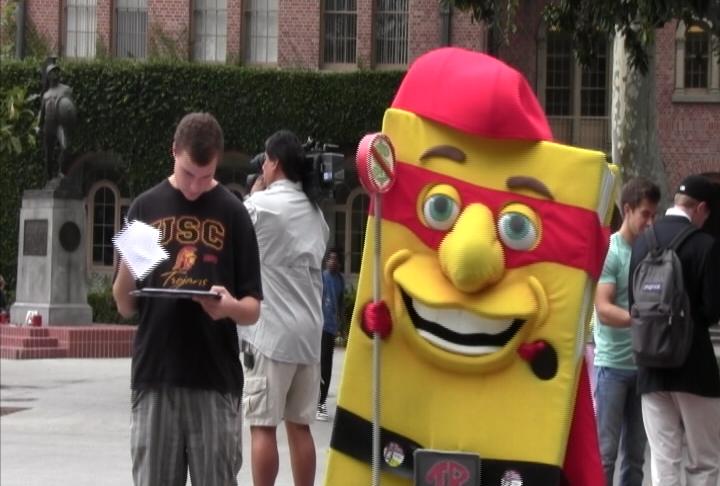Masked Hero Brings Textbook Rebellion to USC

Students at USC gathered Monday to fight for affordable textbooks with a mascot that looks like SpongeBob in a red cape.
USC students participate in the Textbook Rebellion, a national campaign urging instructors and publishers to find cheaper alternatives to high priced textbooks. The movement led by the yellow-masked hero, Textbook Rebel, against the overpriced book menace, Mr. $200 Textbook, urges high education publishers to provide customized materials for instructors so they distribute material pertinent to their class.
“How many times have you taken a class and you only use one chapter [of the book]?” said Raymond McDermott, senior manager of course materials at USC’s Pertusati Bookstore told the Daily Trojan. “By doing customs, professors can do a custom version that only has certain chapters and can add instructive notes.”
According to College Board, students spent $1,137 on books and supplies in the last year. The National Association of College Stores said the average full-time student spent a total of $667 on textbooks during the 2009-10 school year, with $483 spent the campus store.
Publishers responded to textbook rebels by pointing out the decline in materials purchased from publishers. A spokesperson for the Association of American Publishers told the Washington Post,“The nation’s higher education publishers have been aggressively working to provide students with multiple course material options in a wide variety of prices and formats. Their efforts have led to cost savings for students: unlike tuition, typical student spending on publisher produced materials has declined 8-percent in 2009 vs 2001, according to the most recent study by Student Monitor.”
Members of the rebellion group have emphasized publishers that produce cheaper textbooks, such as Flat World Knowledge, a new publishing company that provides free digital versions of its peer-reviewed textbooks. However, Flat World Knowledge has produced only around 40 titles — nowhere near the vast number produced annually by traditional publishing houses and assigned to students by department heads and professors. Although these books are affordable, some worry about their quality.
“Textbooks should be as cheap as possible, but not cheap,” said Charles Stangor, a U-Md. psychology professor, putting his own spin on the Einstein quote, “Make things as simple as possible, but not simpler.”
Many USC professors use custom textbooks today to teach general education courses, 25 of which can be found at the USC bookstore.










